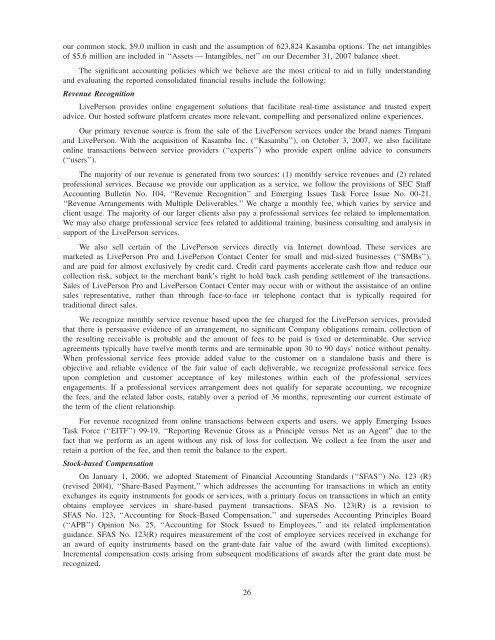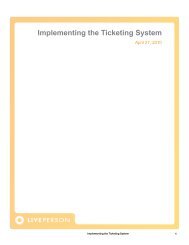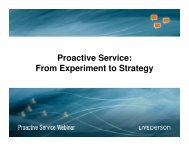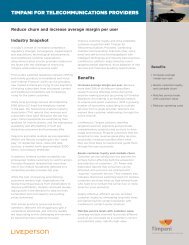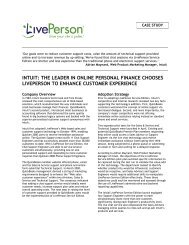Annual Report 2007 - LivePerson
Annual Report 2007 - LivePerson
Annual Report 2007 - LivePerson
You also want an ePaper? Increase the reach of your titles
YUMPU automatically turns print PDFs into web optimized ePapers that Google loves.
our common stock, $9.0 million in cash and the assumption of 623,824 Kasamba options. The net intangibles<br />
of $5.6 million are included in ‘‘Assets — Intangibles, net’’ on our December 31, <strong>2007</strong> balance sheet.<br />
The significant accounting policies which we believe are the most critical to aid in fully understanding<br />
and evaluating the reported consolidated financial results include the following:<br />
Revenue Recognition<br />
<strong>LivePerson</strong> provides online engagement solutions that facilitate real-time assistance and trusted expert<br />
advice. Our hosted software platform creates more relevant, compelling and personalized online experiences.<br />
Our primary revenue source is from the sale of the <strong>LivePerson</strong> services under the brand names Timpani<br />
and <strong>LivePerson</strong>. With the acquisition of Kasamba Inc. (‘‘Kasamba’’), on October 3, <strong>2007</strong>, we also facilitate<br />
online transactions between service providers (‘‘experts’’) who provide expert online advice to consumers<br />
(‘‘users’’).<br />
The majority of our revenue is generated from two sources: (1) monthly service revenues and (2) related<br />
professional services. Because we provide our application as a service, we follow the provisions of SEC Staff<br />
Accounting Bulletin No. 104, ‘‘Revenue Recognition’’ and Emerging Issues Task Force Issue No. 00-21,<br />
‘‘Revenue Arrangements with Multiple Deliverables.’’ We charge a monthly fee, which varies by service and<br />
client usage. The majority of our larger clients also pay a professional services fee related to implementation.<br />
We may also charge professional service fees related to additional training, business consulting and analysis in<br />
support of the <strong>LivePerson</strong> services.<br />
We also sell certain of the <strong>LivePerson</strong> services directly via Internet download. These services are<br />
marketed as <strong>LivePerson</strong> Pro and <strong>LivePerson</strong> Contact Center for small and mid-sized businesses (‘‘SMBs’’),<br />
and are paid for almost exclusively by credit card. Credit card payments accelerate cash flow and reduce our<br />
collection risk, subject to the merchant bank’s right to hold back cash pending settlement of the transactions.<br />
Sales of <strong>LivePerson</strong> Pro and <strong>LivePerson</strong> Contact Center may occur with or without the assistance of an online<br />
sales representative, rather than through face-to-face or telephone contact that is typically required for<br />
traditional direct sales.<br />
We recognize monthly service revenue based upon the fee charged for the <strong>LivePerson</strong> services, provided<br />
that there is persuasive evidence of an arrangement, no significant Company obligations remain, collection of<br />
the resulting receivable is probable and the amount of fees to be paid is fixed or determinable. Our service<br />
agreements typically have twelve month terms and are terminable upon 30 to 90 days’ notice without penalty.<br />
When professional service fees provide added value to the customer on a standalone basis and there is<br />
objective and reliable evidence of the fair value of each deliverable, we recognize professional service fees<br />
upon completion and customer acceptance of key milestones within each of the professional services<br />
engagements. If a professional services arrangement does not qualify for separate accounting, we recognize<br />
the fees, and the related labor costs, ratably over a period of 36 months, representing our current estimate of<br />
the term of the client relationship.<br />
For revenue recognized from online transactions between experts and users, we apply Emerging Issues<br />
Task Force (‘‘EITF’’) 99-19, ‘‘<strong>Report</strong>ing Revenue Gross as a Principle versus Net as an Agent’’ due to the<br />
fact that we perform as an agent without any risk of loss for collection. We collect a fee from the user and<br />
retain a portion of the fee, and then remit the balance to the expert.<br />
Stock-based Compensation<br />
On January 1, 2006, we adopted Statement of Financial Accounting Standards (‘‘SFAS’’) No. 123 (R)<br />
(revised 2004), ‘‘Share-Based Payment,’’ which addresses the accounting for transactions in which an entity<br />
exchanges its equity instruments for goods or services, with a primary focus on transactions in which an entity<br />
obtains employee services in share-based payment transactions. SFAS No. 123(R) is a revision to<br />
SFAS No. 123, ‘‘Accounting for Stock-Based Compensation,’’ and supersedes Accounting Principles Board<br />
(‘‘APB’’) Opinion No. 25, ‘‘Accounting for Stock Issued to Employees,’’ and its related implementation<br />
guidance. SFAS No. 123(R) requires measurement of the cost of employee services received in exchange for<br />
an award of equity instruments based on the grant-date fair value of the award (with limited exceptions).<br />
Incremental compensation costs arising from subsequent modifications of awards after the grant date must be<br />
recognized.<br />
26


